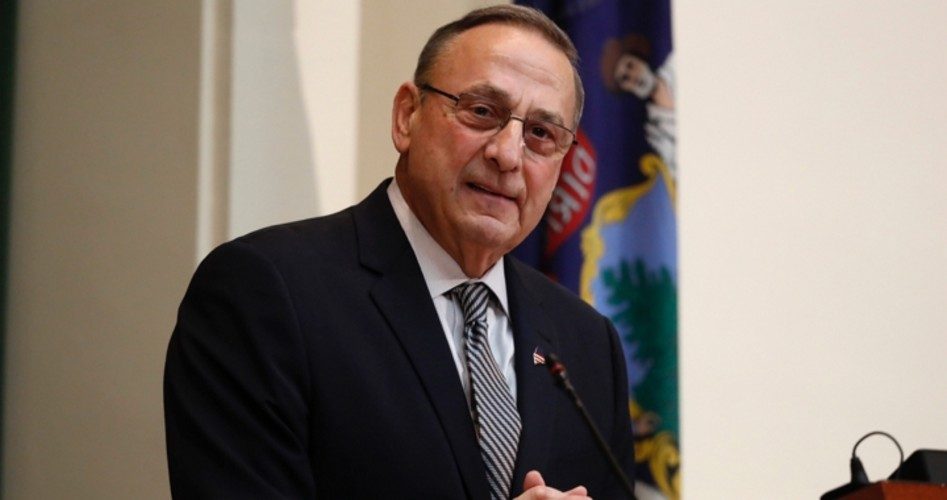
Maine’s Republican Governor Paul LePage (shown) has provoked harsh criticisms from LGBT activists by vetoing a bill that would have banned therapists from counseling individuals with unwanted same-sex attraction. Governor LePage observed that the bill was far too broad, and infringed upon individual rights and religious liberties in particular. LePage also accused the bill’s proponents of having a double standard in regards to the rights of children after they opposed legislation that would have ended female genital mutilation, practiced by some Muslims.
Under Bill LD 912, individuals would have been forced to refrain from engaging in “conversion therapy” activities to “advertise, offer, or administer conversion therapy to individuals after 18 years of age.” The bill defined such therapy as “practice or treatment that seeks to change an individual’s sexual orientation or gender identity.”
While the bill carved out exceptions for clergy, it would have revoked or suspended the licenses of medical professionals, school psychologists, or school guidance counselors that engaged in the therapy.
But the bill, Governor LePage notes, was so broad that it would have prohibited licensed professionals from providing counseling even at the request of the individual patient.
“This bill attempts to regulate professionals who already have a defined scope of practice and standard of care per their statutory licensing requirements,” his veto message reads.
LePage also claims that the bill would have infringed upon religious liberties.
“Parents have the right to seek counsel and treatment for their children from professionals who do not oppose the parents’ own religious beliefs,” he writes.
LePage made several other observations. He notes that the bill is a solution looking for a problem, as there has been no evidence presented during the many public meetings on the bill that such conversion therapy is being used by anyone in the state of Maine.
LePage then reminded proponents of the bill that the alleged absence of evidence that the practice of conversion therapy was taking place in the state of Maine was the very same excuse used when Maine’s Legislature failed to pass a bill that would have criminalized the practice of female genital mutilation in the state.
“LD 1904 sought to ban ‘female genital mutilation,’ or ‘FGM,’ a heinous procedure involving partial or total removal of female genitalia for cultural or religious reasons,” he wrote. “FGM is practiced on girls as young as infants up until the age of 14. The practitioner is often not a medical professional and the cutting is not typically done in a sterile setting with sterile tools….These girls are mutilated for life.”
New Boston Post reports that female genital mutilation is practiced by Muslims in some cultures, including in Somalia, to promote chastity, and that Maine’s two largest cities — Portland and Lewistown — have significant Somali populations.
And unlike in the case of conversion therapy, there is significant evidence that FGM is taking place in Maine. LePage observes in his veto message that doctors and nurses in Maine hospitals have seen the results of FGM, but that exact figures were hard to know because parents do not report that type of mutilation and the girls are unlikely to report on their parents. But in 2013, 1,603 women in Maine, 399 under the age of 18, were believed to be at risk.
Yet legislators claimed that the practice was not happening in the state, and so the bill should not be passed. LePage contends that these legislators are guilty of hypocrisy.
“Legislators who could not stand up and outlaw the permanent mutilation of young girls’ sexual organs by laypersons in unsanitary conditions with razor blades now are concerned with outlawing conversations, of which there is also ‘no evidence’ that it is happening in Maine,” LePage said in his veto message. “This is a disgusting double-standard.”
Regardless, LGBT activists are viewing LePage’s veto as an act of hostility against the LGBT community.
Matt Moonen of Equality Maine claims that LePage chose “petty politics over protecting kids,” and Human Rights Campaign national field director Marty Rouse called the veto “inexcusable.”
“With this inexcusable decision, Governor LePage has become the only governor in the nation to veto legislation protecting young people from this abuse, solidifying his place in history’s hall of shame,” Rouse opined.
According to opponents of the bill, LD 912 would have done more harm than any supposed good. In a post written for The Federalist, Walt Heyer, a former “trans-woman,” explains that conversion therapy saved his life. Heyer explains that he saw two Christian psychotherapists who helped him to leave behind his life as a trans-woman, and that if a ban such as the one proposed in Maine were in place at the time, he likely would have succumbed to suicide.
Despite claims that bills such as LD 912 seek to help young people, they actually “make sure the gender-dysphoric people they claim to be ‘helping’ have no way out, even if that’s what they desperately want,” Heyer wrote. “Only an uncaring legislature would sign such a draconian bill into law.”
While Maine legislators can enact the law if two-thirds of the state House and two-thirds of the state Senate override the veto, it’s unclear that there are enough votes to do so.
Photo: AP Images




